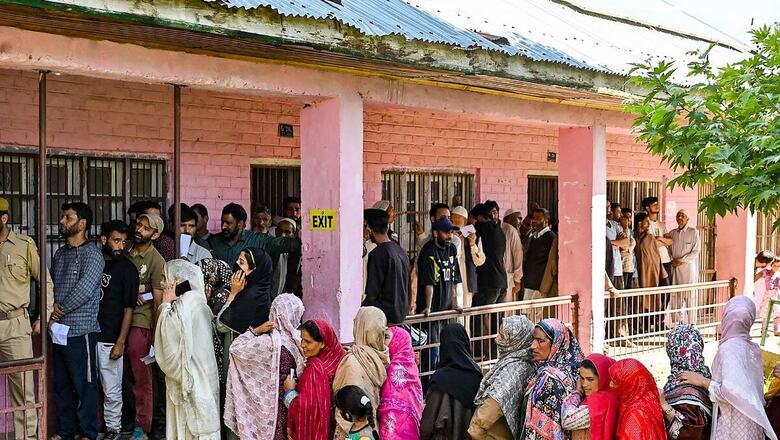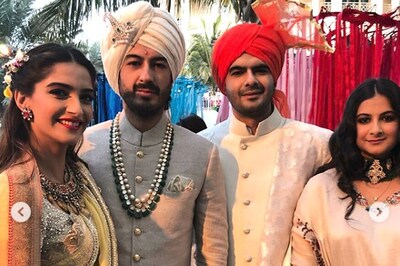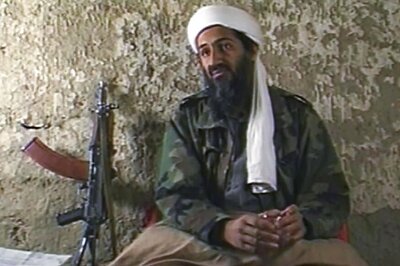
views
The results of the Assembly elections have marked the end of romanticised narratives surrounding the erstwhile princely state of Jammu and Kashmir, now a Union Territory. The differing political moods of the Kashmir Valley and Jammu present National Conference (NC) leader Omar Abdullah with a challenging path ahead. While voters in Jammu have supported the abrogation of Articles 370 and 35-A, the people of the Valley have placed their faith in the NC’s manifesto, which promises the restoration of the state’s special status.
As we reflect on the events of October 1947, when Pakistan attempted but failed to seize the Muslim-majority princely state, it’s clear that this historical context remains significant today. Due to the shortsightedness of Maharaja Hari Singh and the betrayal by Sheikh Abdullah, the then state’s prime minister, Jammu & Kashmir never experienced democratisation like other Indian states. Once former Prime Minister Jawaharlal Nehru realised Sheikh Abdullah’s true intentions, he deemed it wise to imprison his trusted ally. Although Sheikh Abdullah was later released and even became the state’s chief minister, his family came to treat the position as their birthright. However, much water has flowed under the Jhelum River since then.
Despite several attempts to scorch the region’s Chinar trees, the heirs of Syama Prasad Mookerjee’s legacy have managed to consign Articles 370 and 35-A to the pages of constitutional history. The high voter turnout has dispelled doubts and suspicions.
Political representatives have historically distanced the people of Kashmir from the realities on the ground through rumours and misinformation. Initially, Omar Abdullah refused to contest the Assembly elections, fearing that his participation would lend legitimacy to the state’s new constitutional status. However, the allure of the chief minister’s chair has drawn him in.
The road ahead for Omar Abdullah, however, is fraught with challenges. After losing the Lok Sabha election to Engineer Rashid, a separatist ideologue, Abdullah exercised caution in the Assembly election. As a result, the Valley’s electorate did not choose separatists as their representatives. Mehbooba Mufti’s People’s Democratic Party (PDP) has sunk to its lowest level, winning only three seats. The defeat of her daughter, Iltija Mufti, raises serious questions about the party’s future. In the eyes of the Kashmiris, the PDP has become a traitor. Mehbooba’s father, Mufti Mohammad Sayeed, had formed a government with the BJP to find a lasting solution to the Kashmir issue, but the PDP-BJP alliance has always been viewed with suspicion in the Valley.
Having served as a minister in Atal Bihari Vajpayee’s government, Omar Abdullah cannot ignore national interests. National Conference, with its 42 seats, has fallen short of a majority and will be dependent on its coalition partner Congress, which won just six seats. It is hoped that Omar will avoid confrontations with the Lieutenant Governor and not emulate Arvind Kejriwal’s contentious style of governance. Drawing from his father Farooq Abdullah’s political experience could be beneficial. Farooq has connections with almost all major political parties in the country and understands the importance of the Central government in Jammu & Kashmir’s politics. However, Farooq’s contradictory statements have often emboldened the enemies of the nation.
It would not be incorrect to say that the roots of the separatist movement deepened due to the 1987 Assembly elections, which saw the National Conference in alliance with its current partner, the Congress. Allegations of electoral rigging were rampant at the time, and it was during Farooq Abdullah’s tenure as chief minister that then Union Home Minister Mufti Mohammad Sayeed’s daughter, Rubaiya Sayeed, was kidnapped, leading to the release of militants under pressure from the Central government.
Then Prime Minister Vishwanath Pratap Singh’s lack of sensitivity towards national security worsened the situation in the Valley, and by January 1990, the exodus of Kashmiri Pandits began as they were forced to flee to save their lives. Back then, the BJP was not a major player in state politics, but with 29 seats in this Assembly election, the party is now positioned as a strong opposition.
The implication is clear: those legislators who support the August 5, 2019, decision will not allow the Abdullah family’s dreams of autonomy to come true. The demand for autonomy has intellectually fuelled the separatist movement.
Under the veil of the Abdullah family’s secularism, true communal harmony has not flourished, and religious minorities in the Valley continue to feel unsafe. The process of the Pandits’ return remains incomplete, as the warm winds from Pakistan continue to scorch the fragile leaves of goodwill, and the hands of neighbours are not raised to welcome their displaced brethren. In recent months, terrorists have targeted non-Kashmiri labourers working in Kashmir, exposing their dangerous agenda. Meanwhile, in Jammu, militants have presented new challenges to the security forces.
The euphoric reactions of National Conference supporters after the party’s victory could weaken the bonds of trust and hinder the creation of an environment conducive to the restoration of full statehood for Jammu & Kashmir. During the colonial period, it was the breakdown of religious harmony that led to the creation of Pakistan. The Pakistani state has shown little interest in fulfilling its constitutional responsibilities, which is why the Hindu population has steadily declined over the past seven decades. The persecution of Hindus and other minorities continues unabated in ungrateful Bangladesh as well.
In independent India, secularism is the lifeblood of political life. The BJP is aware of the limits of Hindutva politics and thus seeks alliances with parties from diverse ideologies. If Omar Abdullah works to ensure economic development and the creation of job opportunities, the gardens of Shalimar will continue to bloom.
Prashant Kumar Mishra is an independent journalist and political analyst. Views expressed in the above piece are personal and solely those of the author. They do not necessarily reflect News18’s views.




















Comments
0 comment